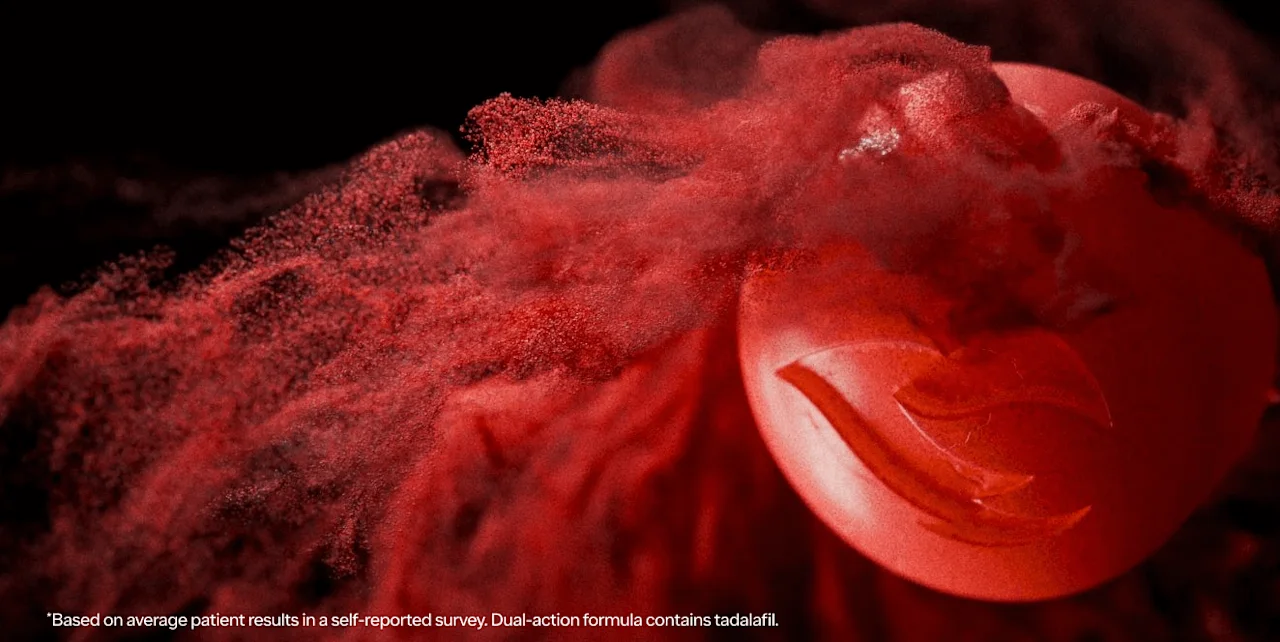Here's what we'll cover
Getting an erection was probably a lot easier in your teens––sometimes too easy. They would show up day and night, often popping up at the most inconvenient times.
But as we get older and our hormones settle down a little, the opposite sometimes becomes true. With each decade of life, some men experience erectile dysfunction (ED) and find their erections don’t last as long or aren’t as hard as they’d like.
If you feel your erections aren’t as firm as you want, there are plenty of ways to make them harder. Here’s everything you need to know about how hard an erection should be, what makes it more difficult to get hard, and how to get a rock-hard erection for satisfying sex.
What makes an erection hard?
When a penis goes from flaccid to rock-hard, the secret ingredient (so to speak) is blood flow. When a man is aroused, blood flows into vessels that fill two tubes in the penis called the corpus cavernosum.
Just like a water balloon, this influx of blood inflates the tubes, transforming them from small, flexible, and soft, to longer, rigid, and hard. But since blood flow is required for this process, anything that disrupts that can make it more difficult to get an erection.
Why does a firm erection matter?
The strength and frequency of your erections are important indicators of overall health. Blood vessels in the penis are smaller than arteries in other parts of the body, so any problems––like blockages, blood vessel dilation issues, or hormone imbalances––can show up as erectile dysfunction. Some cases of ED are due to stress, psychological issues, and age, but ED can also be an indicator of more serious problems like a heart attack or stroke.
Health conditions that can trigger ED include:
Heart disease: Conditions that make your heart pump less effectively can make it more difficult for blood to reach your penis.
Atherosclerosis: The buildup of plaque in the blood vessels—which can result from high cholesterol, high blood pressure, cigarette smoking, and diabetes—can affect blood flow to the penis.
Diabetes: Uncontrolled diabetes results in high levels of sugar in the blood. This can damage blood vessels that carry blood to the penis and nerves involved in stimulating an erection.
Medications: Certain medications used to treat other conditions like hair loss, BPH (benign prostatic hyperplasia), anxiety, or depression can cause ED.
Procedures: Treatments for conditions like prostate cancer can sometimes damage structures involved in getting an erection.
Other health conditions: Kidney failure, multiple sclerosis, or a history of stroke or injury can contribute to the development of ED.
When there’s a problem under the hood, it doesn’t mean erections stop all at once. Sometimes they just aren’t quite as hard as they used to be. If you’re bothered by softer erections, or they’re affecting your sex life, there are things you can do that we’ll discuss in more detail below.
How scientists measure erections
When it comes to erections, how long they last is just as important as how hard they get. That’s why scientists and healthcare providers have created scales to gauge erections and offer concrete solutions for people who find it difficult to get hard.
The erectile hardness scale
A healthcare specialist might ask you to evaluate the firmness of your erections using the Erection Hardness Score. It’s a simple starting point, but most guys know if they’ve moved from 3 to 2 on this scale (Parisot, 2014):
0: Penis does not enlarge
1: Penis is larger, but not hard
2: Penis is hard, but not hard enough for penetration
3: Penis is hard enough for penetration, but not completely hard
4: Penis is completely hard and fully rigid
For a more comprehensive assessment tool, there’s also a tool called the International Index of Erectile Function (IIEF) questionnaire (Rosen, 1997).
The International Index of Erectile Function
A simplified version of the IIEF has only five questions. It’s not a perfect tool, but it’s simple, short, and gets you thinking about the difference between getting an erection and being hard enough for penetration and having a healthy sex life (because those are two different things).
Here are some sample questions from the IIEF (Rosen, 1997):
How confident are you that you can get and keep an erection?
When you get an erection with sexual stimulation, how often are your erections hard enough for penetration?
Are you able to maintain your erection after you’ve penetrated your partner?
Is it difficult to maintain your erection to orgasm or ejaculation?
How often is sex satisfactory for you?
How to get harder erections
The first step to getting a better erection is making sure you’re healthy. Regular check-ups with a healthcare provider and keeping up with annual physicals is always a good idea. If something doesn’t feel right, let your doctor know about any underlying conditions that might be contributing to your ED.
Conditions like high blood pressure, heart disease, diabetes, and high cholesterol frequently cause no symptoms at all. A simple blood test and a physical exam will usually clue your provider into whether more testing is necessary, or if medications and lifestyle changes should be recommended.
Currently, the most effective ED treatments are a class of medications that include drugs like Viagra (generic name sildenafil) and Cialis (generic name tadalafil), among others. Eating right, getting exercise, and quitting smoking are other steps you can take on your own to get stronger erections.
Can erections get too hard?
If your erections are really strong, fantastic. Regular erections—including daily morning erections—are an important measure of a person’s health. If you get strong, frequent erections, that’s great! There’s no need to be concerned about being “too hard” as your body only has enough blood to offer.
However, an erection that lasts too long can be dangerous. This condition is known as priapism, which can damage the delicate structures in your penis. If you’ve had an erection lasting longer than four hours, contact a healthcare provider or seek emergency care immediately.
Firm erections and erectile dysfunction
If you’re having trouble getting or maintaining a firm erection, talk to a healthcare provider (and talk to your partner). ED is relatively common, and as we’ve noted, there are many ways to treat the causes and symptoms so that you can attain a healthy and enriching sex life.
DISCLAIMER
If you have any medical questions or concerns, please talk to your healthcare provider. The articles on Health Guide are underpinned by peer-reviewed research and information drawn from medical societies and governmental agencies. However, they are not a substitute for professional medical advice, diagnosis, or treatment.
Viagra Important Safety Information: Read more about serious warnings and safety info.
Cialis Important Safety Information: Read more about serious warnings and safety info.
References
Parisot, J., Yiou, R., Salomon, L., et al. (2014). Erection hardness score for the evaluation of erectile dysfunction: Further psychometric assessment in patients treated by intracavernous prostaglandins injections after radical prostatectomy. The Journal of Sexual Medicine , 11 (8), 2109–2118. doi:10.1111/jsm.12584. Retrieved from https://onlinelibrary.wiley.com/doi/full/10.1111/jsm.12584
Rosen, R., Riley, A., Wagner G, et al. (1997). The International Index of Erectile Function (IIEF): A multidimensional scale for assessment of erectile dysfunction. Urology , 49, 822-830. doi:10.1016/s0090-4295(97)00238-0. Retrieved from https://pubmed.ncbi.nlm.nih.gov/9187685/













